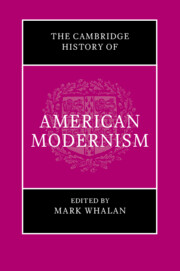Book contents
- The Cambridge History of American Modernism
- The Cambridge History of American Modernism
- Copyright page
- Contents
- Figures
- Contributors
- Acknowledgments
- Chronology
- Introduction
- Part I Methodologies
- Part II Forms, Genre, and Media
- 7 New Visual Media
- 8 Midwestern Modernism and the Radio
- 9 Modernist Writing and Painting
- 10 Modern Folk, Modernist Documentary
- 11 Skyscraper Organizations
- 12 The Jazz Age
- 13 Modernism’s Deep Roots
- 14 Modernizing the American Short Story
- 15 Modernist American Long Poems
- 16 The Modernist Lyric and Its Discontents
- 17 Anthologies
- 18 Fragile Realism
- 19 Post-World War II Theater and Media
- 20 The Limits of an American Modernist Avant-Garde
- 21 Magazines
- 22 The Modernist Presses
- 23 Literary Criticism
- 24 Libertad Bajo Palabra
- Part III Situating US Modernism
- Select Bibliography
- Index
15 - Modernist American Long Poems
from Part II - Forms, Genre, and Media
Published online by Cambridge University Press: 13 July 2023
- The Cambridge History of American Modernism
- The Cambridge History of American Modernism
- Copyright page
- Contents
- Figures
- Contributors
- Acknowledgments
- Chronology
- Introduction
- Part I Methodologies
- Part II Forms, Genre, and Media
- 7 New Visual Media
- 8 Midwestern Modernism and the Radio
- 9 Modernist Writing and Painting
- 10 Modern Folk, Modernist Documentary
- 11 Skyscraper Organizations
- 12 The Jazz Age
- 13 Modernism’s Deep Roots
- 14 Modernizing the American Short Story
- 15 Modernist American Long Poems
- 16 The Modernist Lyric and Its Discontents
- 17 Anthologies
- 18 Fragile Realism
- 19 Post-World War II Theater and Media
- 20 The Limits of an American Modernist Avant-Garde
- 21 Magazines
- 22 The Modernist Presses
- 23 Literary Criticism
- 24 Libertad Bajo Palabra
- Part III Situating US Modernism
- Select Bibliography
- Index
Summary
This chapter considers Ezra Pound’s The Cantos, William Carlos Williams’ Paterson, and Charles Olson’s The Maximus Poems in light of the various difficulties they pose to readers interested in thinking of them in formal and also in generic terms (however broadly construed). I suggest that each of them might be understood as individual attempts to resist intellectual, critical, and hermeneutic recourse to any such generalization per se. A salient feature of these “modernist” “American” “long poems” consists in a variable but tenacious schedule of negations: of literary conventions, of readerly expectations, of internal consistencies, and, ultimately, of any sense of an ending whatsoever. I reflect upon the implications of negation and excess when discussing “long poems” by three straight, white male poets, especially in a context as institutional as a Cambridge History.
Keywords
- Type
- Chapter
- Information
- The Cambridge History of American Modernism , pp. 268 - 284Publisher: Cambridge University PressPrint publication year: 2023

